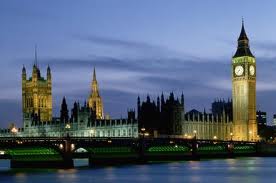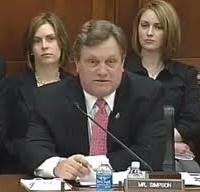Nuclear energy R&D budgets spared major cuts
Congress trims funding while adding new priorities
 A Congress that has public approval ratings in the single digits because of deficit-related gridlock managed to get some of the federal budget out the door for 2012. The Energy & Water Appropriation Bill, which covers funding for the U.S. Department of Energy, contains $768 million for nuclear energy programs.
A Congress that has public approval ratings in the single digits because of deficit-related gridlock managed to get some of the federal budget out the door for 2012. The Energy & Water Appropriation Bill, which covers funding for the U.S. Department of Energy, contains $768 million for nuclear energy programs.
Nuclear energy at the DOE fared better than some other high profile DOE programs. The Obama administration's poster child for a green economy-Energy Efficiency & Renewable Energy-suffered a cut of $1.9 billion, reducing the funding request by the White House by more than half. The DOE's Science programs also saw a significant reduction of $616 million from the President's budget. And, nationwide environmental cleanup of DOE sites suffered a reduction of $469 million.
Emphasis on small modular reactors
Of the $768 million in the bill for the nuclear energy program at the DOE, $439 million is allocated to nuclear energy research and development. A key element of the appropriation is a $67 million line item for licensing technical support for light water reactors. It provides funds for first-of-a-kind engineering support for two reactor designs and sites.
 Supporters of fast reactor SMR designs had hoped for appropriation language that would have advanced their cause, but it didn't appear in the committee report related to licensing activities.
Supporters of fast reactor SMR designs had hoped for appropriation language that would have advanced their cause, but it didn't appear in the committee report related to licensing activities.
Within a line item of $136 million for reactor concepts, $29 million is provided for advanced R&D on SMR concepts that presumably would include some fast reactor work scope.
A big ticket item is $64 million for the Next Generation Nuclear Plant (NGNP) program, which is $14 million above the DOE's request. The committee called for strong engagement with industry in development of the NGNP demonstration phase.
Congress also told the DOE to stick to the knitting and finish the job on the NGNP. The committee report complained that the DOE engages in a "constant shifting of priorities that starts many initiatives and finishes none."
DOE Nuclear Energy Assistant Secretary Pete Lyons declined, through a spokesperson, to be interviewed or to comment on the funding numbers or the SMR projects.
Fuel Cycle Research received $132 million, with significant cuts from the 2011 funding level and the 2012 request.
Facilities management at the Idaho National Laboratory received $155 million, $5 million above the request. Separately, $14.6 million is allocated to the National Science User Facility at the Idaho National Laboratory, the same amount as the request.
Positive reactions to reactor funding
U.S. Rep. Mike Simpson (R., Idaho) , whose district includes the Idaho lab, is a senior member of the House Appropriations Subcommittee on Energy and Water Development, serving there for the past nine years. Simpson said in a statement that he was pleased with the funding for the lab's programs.
"I am very pleased that the Appropriations Committee and Congress have once again demonstrated strong support for the development of nuclear energy and provided the resources necessary to continue our nation's progress on new and promising nuclear technologies," said Simpson.
Simpson noted that total funding for DOE's nuclear energy program was $31 million more than funding provide by Congress for FY2011.
The Nuclear Energy Institute, a trade group, also took notice. In a statement on its website, the organization said that it was relieved that the events in Fukushima, Japan, last March have not deterred Congress from continued support for nuclear energy.
"We particularly appreciate the inclusion of $67 million to initiate the Department of Energy's small reactor licensing program. That technology will become a significant contributor to the nation's energy portfolio and has tremendous potential for job creation to support deployment in the United States and internationally," the NEI statement said.
Worries across the pond in the U.K.
While nuclear energy R&D fared well in the budget storm in Washington, D.C., across the Atlantic things are not going as well. The Science & Technology Committee of the House of Lords, the upper chamber of Parliament, issued a report on November 22 that said the government was "complacent" about nuclear energy R&D.
 In a stinging comment, the committee wrote that the UK government's plans for nuclear to play a part in meeting the country's energy needs "simply lack credibility."
In a stinging comment, the committee wrote that the UK government's plans for nuclear to play a part in meeting the country's energy needs "simply lack credibility."
The report went on to say that the absence of leadership and strategic thinking in government has created a perception that the UK is no longer a serious player in the field. The skills gap, which will be made worse by near-term retirements, will make the nation a "niche player," the report said.
According to government budget numbers reviewed by the committee, the UK is spending less on nuclear energy R&D than Australia and Italy---and neither of these nations has a commercial nuclear power program.
The committee called for an increase in spending of £20-50 million (about U.S.$31-78 million) a year. The committee's recommendations include the development of a long-term strategy for nuclear energy looking beyond 2025, outlining support for R&D through an R&D roadmap, and for the commercial exploitation of the UK's current strengths in nuclear research.
It also called for the establishment of a nuclear R&D board, made up of industry, academic and government partners, to develop and implement the R&D roadmap and help to improve the coordination of R&D activities to protect vulnerable areas of research and close gaps in capabilities.
# # #
Dan Yurman publishes Idaho Samizdat, a blog about nuclear energy, and is a frequent contributor to ANS Nuclear Cafe.







